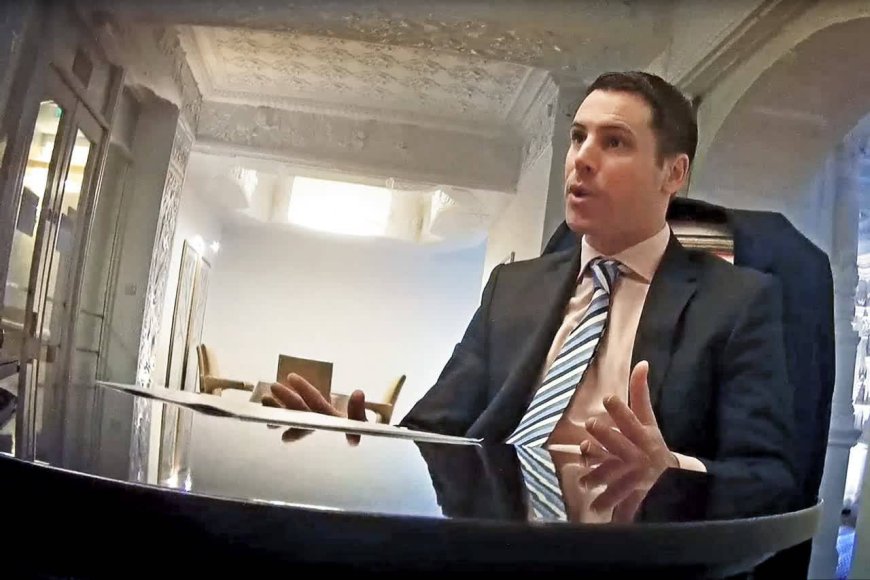The Benton Scandal: Uncovering the Deep-Seated Culture of Financial Corruption among British Politicians
In a shocking report by the Commons Standards Committee, Scott Benton, the Member of Parliament for Blackpool South, finds himself at the center of a maelstrom, facing a potential suspension of up to 35 days for his alleged "very serious breaches" of parliamentary standards. The repercussions, should the suspension be enacted, could have far-reaching ramifications, not only for Benton himself but for the Conservative Party as a whole.

The genesis of this controversy lies in Benton's purported transgressions of House of Commons lobbying laws, as detailed in an exposé conducted by an undercover journalist from The Times newspaper. This investigative journalist, surreptitiously filming their encounter with the British politician in question, posed as a representative of an investment fund, ultimately unearthing concerning allegations against Benton.
The report claims that Benton boasted of possessing "easy access" to ministers and solicited his fellow colleagues for parliamentary votes by offering favors in return. Furthermore, he stands accused of leveraging his position to lobby on behalf of the gambling industry and clandestinely leaking confidential documents in exchange for a monthly remuneration of up to £4,000.
It is worth noting that Benton, at that time, held the influential position of heading the parliamentary task force on gambling. In response to these grave allegations, Benton submitted a rebuttal to the House of Commons standards committee, vehemently denying any violation of parliamentary rules and asserting his adherence to both the letter and spirit of the regulations.
However, the newspaper's account presents a contrasting view, revealing Benton's admission of wrongdoing during the secret meeting and his readiness to collaborate in exchange for financial recompense, while pointing out that other parliamentarians have similarly partaken in such practices.
The House of Commons Standards Committee's subsequent inquiry has also exposed Benton's blatant lapse in political ethics. The committee's report labels him as "sellable" and "corrupt, asserting that his conduct has conveyed a regrettable message about the current standards in Parliament and has tarnished the reputation of all MPs. As a consequence, the committee has recommended a punitive course of action, proposing a 35-day suspension without salary, pending approval by the House of Commons members.
It is crucial to underscore that should the representatives vote in favor of Benton's suspension, as per the protocols outlined in the House of Commons, the absence of a representative from each constituency for more than 10 days would lead to a public recall in that particular constituency. If this recall garners the positive vote of 10% of eligible voters within the constituency, mid-term elections will become a mandatory course of action. Thus, with Benton having won his seat by a meager 3,690 votes, his political future hangs precariously in the balance.
On the other hand, the Conservative Party finds itself confronting yet another by-election in the Wellingborough constituency, precipitated by the sexual abuse scandal involving their former MP, Peter Bone. This development compounds the challenges faced by the incumbent Prime Minister Rishi Sunak, who now faces the looming specter of an additional by-election, as the deadline for petitions expired on December 19.
Sunak's premiership has already been marred by four previous mid-term elections, all of which resulted in defeat for the Tories. Notably, in the Tamworth constituency, the opposition Labour Party managed to overturn the Conservatives' advantage of 20,000 votes, securing seats in the House of Commons.
According to observers, the confluence of successive scandals and a waning popularity for the Prime Minister only exacerbates the gravity of this political crisis. Coupled with pressing challenges such as illegal immigration, the mishandling of the pandemic, escalating living costs, the highly controversial plan to deport refugees to Rwanda, and the unresolved issues in Northern Ireland, it becomes apparent that the ruling party is hurtling towards a potentially contentious general election in the upcoming months.
As the Tories grapple with the widening chasms within their ranks and the erosion of public confidence, it is imperative for Prime Minister Sunak to confront these pressing issues head-on and correct his domestic and foreign policies. The very fabric of British governance hangs in the balance, and the need for decisive action cannot be overstated. Failure to address these mounting challenges will undoubtedly perpetuate the perception of a party crumbling under the weight of its own corruption, further alienating an already disillusioned electorate.













































